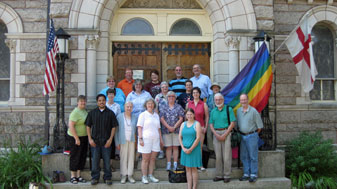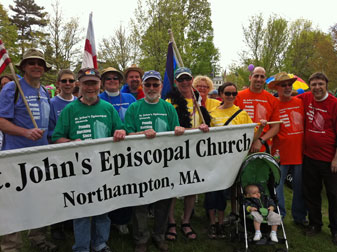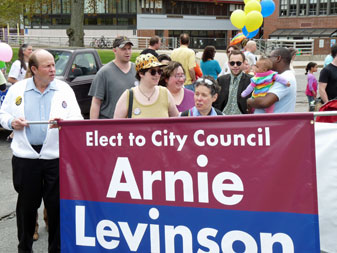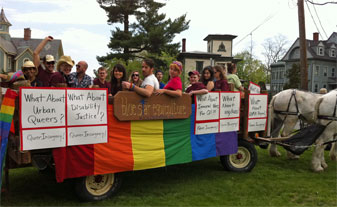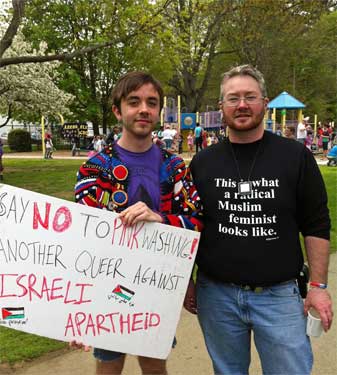Earlier this summer, Richard Beck at Experimental Theology posted about the challenges of studying the Beatitudes with the Bible study group he leads in a men’s prison. Considering the risks of nonviolent compassion in a place ruled by the law of the jungle, he realized afresh how much it can really cost to be a follower of Christ. An excerpt:
…Week to week, as you lead a bible study with prisoners, you can come to believe that this is the most holy, devout, and saintly bunch of Christians you’ve ever seen. This is, incidentally, one of the joys of prison ministry, how nice, grateful and cooperative the men are. You’ll never have a better audience.
But I know that this is a bit of an illusion. To be sure, the men are grateful. The time they have with us is, perhaps, the only non-coercive, relaxed and egalitarian interaction they have during the week. So they are truly grateful and happy to be a part of the bible study. And many have become committed followers of Jesus.
Still, for the most part I know that the devoutness on display during the bible study is hiding a great deal of darkness. And we don’t talk much about that darkness. At least not in our bible study. But I knew it was there and I wanted to try to talk about it a bit before reading the Beatitudes.
So I waited. And asked again, “Inside the prison, who is blessed?”
Finally, a man answered:
“The violent.”
I nodded. “So that is Beatitude #1. ‘Blessed are the violent.’ What else?” The floodgates opened.
The thieves.
The liars.
The manipulators.
The hypocrites.
The wealthy. (There is an underground black market economy.)
The strong.On and on it went. These were the “virtues” that got “blessed” and rewarded inside the prison. These were the “virtues” that helped you get ahead, survive, and thrive. And I wondered, is it any different on the outside where I live?
Not much.
After creating this list we then turned to Matthew 5 and we read aloud:
Blessed are the poor in spirit…
Blessed are those who mourn…
Blessed are the meek…
Blessed are those who hunger and thirst for righteousness…
Blessed are the merciful…
Blessed are the pure in heart…
Blessed are the peacemakers…
Blessed are those who are persecuted because of righteousness…
As we read these words the room became very somber. In light of what we’d just been talking about the radical call of Jesus shone like a white hot light. It burned. When you read the Beatitudes on the outside it all sounds so nice and happy. But read inside a prison you suddenly see just how crazy you have to be to be a follower of Jesus. How the Beatitudes really are a matter of life and death.
I asked the prisoners, can you be meek, poor in spirit, or merciful in prison? Finally opening up, they said no, you can’t. You’d get hurt, taken advantage of, raped, killed. Your days would be numbered if you tried to live out the Beatitudes.
And suddenly, I didn’t know what to say. For it became very clear to me what it would mean for me to preach the Beatitudes to these men. I’d be asking them to give their lives to Jesus. I’d be asking them to die.
So I hesitated. For one simple reason. I didn’t know if I was ready to make that commitment. And sensing hesitancy in my own heart, my own fear of Jesus, I couldn’t ask these men to do something that I myself lacked the courage to do.
None of this was verbalized. After the men described how it would be suicidal to live out the Beatitudes inside the prison we started to talk about how, in small moments here and there, they could let their defenses down to show a little meekness, to show a little mercy. We started to figure out ways they could fit Jesus into the gaps and margins of prison life. Where their shell of violence and toughness could be dropped for a moment.
Basically, we talked about compromise. How to accommodate Jesus to the ruling ethic of prison life. And like I said, I couldn’t ask for anything more. Who was I to push them for more mercy and meekness when I’d be walking out of the prison gates in less than an hour? I didn’t know what I was asking them to do. Nor was I confident about what I would do if I was in their shoes….
I printed out this post and mailed it to my pen pal “Conway”, whose poetry and letters I have shared on this blog. Conway responded with one of the most inspiring stories of Christian love that I have read in a long time. Let me also add that when he wrote this, he was in the middle of a three-week hunger strike to demand more humane conditions in California prisons. Here is an excerpt from his July 4 letter:
I can see some prisoners feeling relaxed inside of the chapel setting in prison. I have only entered the chapel for religious service on one occasion in prison. That was for a friend who had died of AIDS at Vacaville. I was there for maybe two years recovering from being paralyzed by L.A. County sheriffs. (In L.A. County Jail.) It took about eighteen months to be able to walk again.
I was pissed off that it took several months before the service was held for Johnny. He and four others had died from AIDS in that time.
I was listening to the priest or what they call chaplain speak on each man’s life that had passed. And it just seemed so weak to be waiting this long to be approved for a decent ceremony. He’d already been cremated months before. Why now? and why pack them all into one ceremony?
But I do recognize that the blanket patch had to be sewn together with others. It was large.
Still why wait to leave this soul roaming along the halls of that place? It had me mad and I stood up to confront the chaplain. He called me up to the podium and asked me to say a few words of what Johnny was about. The funny thing is even though he was gay and had caught his sentence for protecting himself, this was not what I talked about. It didn’t matter to me what preferences he had. He was just a good dude and I wanted everyone to know it.
All of those cons were crying like babies when I’d finished my tirade. And of course I was too. But the point I make is that the label of holy or devout, what the hell is that, if we are to become righteous in our lifetime. Like I said that was the only one time I went to a religious service. But it amazes me. So many of those guys later on thanked me for standing up and speaking on that day….
…I’m sure I got off track on that subject, but the comments [on the blog post] brought back memories of my connection with their discussion. But I disagree with one point they said you can’t be merciful in prison. Actually you can. It’s not as ruthless a crowd as everyone makes out. Nevertheless it is a harsh environment that one must prove themself everyday. But we all are tested daily.
Visit the website of California Prison Focus to find out more about the hunger strikers’ demands and track the progress of the reforms. Their five core demands were as follows: (1) Eliminate group punishments for prisoners of the same race when one breaks a rule; (2) Reform the criteria for declaring a prisoner to be active in a gang (currently prisoners like my friend Conway are sent to long-term isolation on dubious evidence); (3) Comply with the recommendations of the US Commission on Safety and Abuse in Prisons (2006) regarding an end to longterm solitary confinement; (4) Provide adequate food; (5) Expand and provide constructive programs and privileges for indefinite SHU inmates. (Conway was mentoring at-risk youth until he was transferred to the Segregated Housing Unit on false evidence of gang activity.) The California state legislature held hearings on these issues in August.
Related resources: PrisonerSolidarity.org; TGI Justice Project (advocate for transgender, genderqueer, and intersex inmates).
